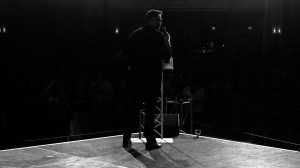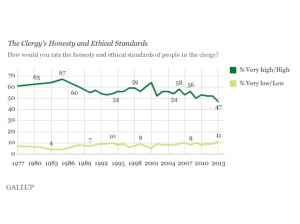In this series

Less than half of the country—just two out of every five Americans—believe clergy are honest and have high ethical standards, a recent Gallup poll found.
That level of trust has dropped steadily since 2009, down from a high of 67 percent in 1985, the pollster reported.
Pastors are now seen as less trustworthy than judges (43%), day care providers (46%), police officers (56%), pharmacists (62%), medical doctors (65%), grade school teachers (66%), military officers (71%), and nurses (82%).
According to religious breakdowns of the data provided to CT, self-identified Christians (776 respondents) are nearly twice as likely as non-Christians (236 respondents) to still have faith in their faith leaders. While nearly half of Christians said pastors had high ethical standards, only a quarter of non-Christians agreed.
Christians also indicated stronger support of military officers, with nearly three-quarters finding them trustworthy (74%), significantly more than non-Christians (63%). Christians were also more likely to trust police officers (59% vs. 46%), auto mechanics (35% vs. 27%), and business executives (18% vs. 13%).
Non-Christians, on the other hand, preferred grade school teachers (71% vs. 65% of Christians), judges (49% vs. 42%), and newspaper reporters (32% vs. 23%).
“Three of the professions rated highest for honesty and ethical standards are in the healthcare field—nurses, medical doctors, and pharmacists—a trend that has been the case in recent years,” Gallup said. “While the clergy are not at the bottom of the list of professions, this year's ratings represent a new low for a profession with image problems in recent years.”

Despite the shrinking trust around clergy in particular, the church overall has maintained its reputation, according to 2017 findings from the Pew Research Center. As CT previously reported, “Americans view the impact of religious institutions more positively than colleges, labor unions, banks, or the media, and their reputation has changed little during the political shifts over the past few years.”
Nurses have topped the ethical professions list almost every year since they began appearing in the survey in 1999. (The one exception: After the September 11 attacks, firefighters won as most trustworthy and ethical.)
At the other end of the list, lobbyists are consistently ranked lowest by Christians, non-Christians, and members of every political party.
Both Christians and non-Christians are also unlikely to trust members of Congress (11% for both), car salespeople (11% of Christians, 10% of non-Christians), and advertisers (13% of Christians, 8% of non-Christians).

Republicans trust clergy even more than Christians do—59 percent rated their honesty and ethical standards highly. Fewer Democrats (41%) and Independents (35%) felt the same.
Republicans split from Democrats and Independents on many other professions, including the most preferred. While Democrats and Independents trust nurses more than anyone else, Republicans trust military officials (87%) even more (84% trust nurses). For comparison, 69 percent of Independents and 60 percent of Democrats trust military leaders.
Republicans are also far more likely to trust police officers (80%, compared to 47% of Independents and 48% of Democrats) and pharmacists (70%, compared to 60% of Independents and 69% of Democrats).
They’re less likely to trust newspaper reporters (12%, compared to 19% of Independents and 46% of Democrats) or TV reporters (12%, compared to 18% of Independents and 39% of Democrats).
Independents are less likely to trust lawyers (13%, compared to 22 percent of Republicans and Democrats) and auto mechanics (28%, compared to 37% of Republicans and Democrats).
Car sales people, members of Congress, advertisers, and lobbyists are at the bottom of the list for Republicans, Democrats, and Independents.
Last year, pastors ranked among the leaders Americans believed could generate healthy conversations about societal issues. Earlier surveys have indicated that Americans view professional athletes as more impactful than faith leaders.
Along with noting drops in pastor trustworthiness in 2012 and 2013, Gallup also found that dynamic pastors are less of a draw for churchgoers than the sermon message itself.
















